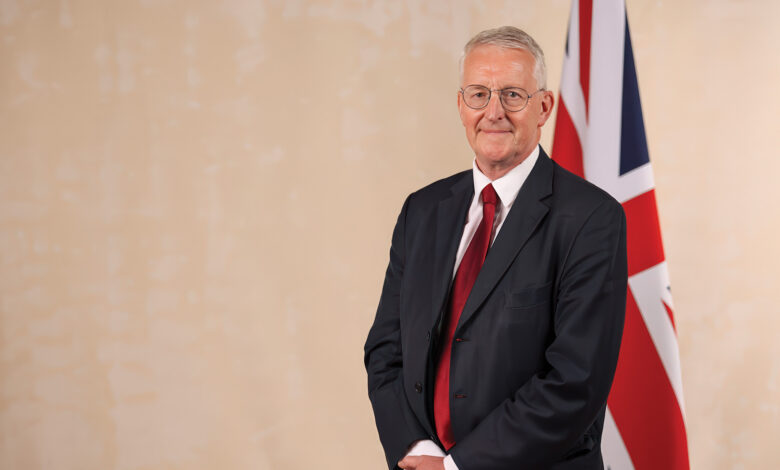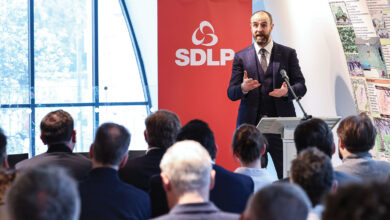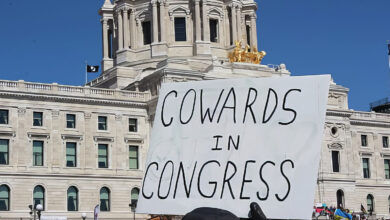Hilary Benn MP: Northern Ireland’s newest Secretary of State

Hilary Benn MP is arguably the most high-profile appointee as Northern Ireland Secretary since Peter Mandelson in 1999. Benn is a political veteran and has mirrored comments by the new Prime Minister on the need for a “re-set” of British-Irish relations.
Keir Starmer MP made a relatively straightforward transition of power when he became British Prime Minister on 10 July 2024, with almost all shadow cabinet appointees retaining their portfolios in government.
A Leeds MP since a 1999 byelection, Benn was appointed as Shadow Northern Ireland Secretary in September 2023, marking a return to the frontline of politics seven years after he had been sacked by former party leader Jeremy Corbyn MP from the frontbench in 2016.
In a 2006 interview for The Guardian, Benn claimed that he was “not a rebel”, following on from comments he made in 1999 that he was “a Benn, but not a Bennite,” in repudiation of the left-wing views of his late father, Tony Benn, who remains an iconic figure for British socialists.
Benn’s self-characterisation, however, did not hold through during Labour’s 14 years out of power between 2010 and 2024, as he rebelled against the left-wing leadership of Corbyn and was a key player in the ultimately unsuccessful People’s Vote campaign for the UK to remain in the EU after the 2016 referendum vote to leave.
Benn was sacked by Corbyn as Shadow Foreign Secretary for calling for the socialist’s resignation as party leader in 2016, and upon his return to the backbenches of the House of Commons, assumed chairmanship of the Brexit Select Committee.
In this committee, Benn sponsored the European Union (Withdrawal) (No. 2) Act 2019, known as the ‘Benn Act’, forcing Boris Johnson to extend the deadline for the UK’s withdrawal from the European Union in October 2019.
With Labour resoundingly beaten in the 2019 election by Johnson’s Tories, Benn accepted that his campaign for the UK to stay in the EU was over, but his interest in the impact of Brexit never waned. In September 2022, as loyalist fears played out over the ‘Irish Sea border’, Benn published a report titled How to Fix the Northern Ireland Protocol alongside the Centre for European Reform.
In the report, he emphasised the importance of avoiding border infrastructure on the island of Ireland while adhering to Brexit requirements.
The new British Government has promised a “reset” in Anglo-Irish relations, as demonstrated via Starmer’s deployment of ‘Guinness diplomacy’ during Taoiseach Simon Harris’ visit to Chequers, making Harris the first foreign visitor to the UK under Starmer’s premiership.
This visit followed a change in tone from Starmer, who, having previously described himself as a “unionist”, stated post-election that his Government will be an “honest broker” over Northern Ireland and any future border poll.
Furthermore, in the King’s Speech, the Government announced its intention to scrap the Legacy Act, a move which has been welcomed by all the local parties and the Irish Government.
The new administration in London brings a new level of understanding of affairs in Northern Ireland, as can be observed through Keir Starmer’s history of working in Northern Ireland, the fact that Sue Gray – a former Permanent Secretary of the Department of Finance – is Downing Street Chief of Staff, and the fact that the new Northern Ireland Secretary is as high-profile as Benn.
There is no doubt that relatively competent actors are now overseeing Northern Ireland policy from London, and Labour will be keen to be interpreted by observers as successful on Northern Ireland, with the legacy of the Good Friday Agreement in 1998 and St Andrews Agreement in 2007 claimed by the party as core achievements of the Tony Blair government.
Whether challenges such as legacy, local finance mechanisms, a potential new Brexit deal, and the debate on Irish reunification can be met by the new British Government, however, remains to be seen.





